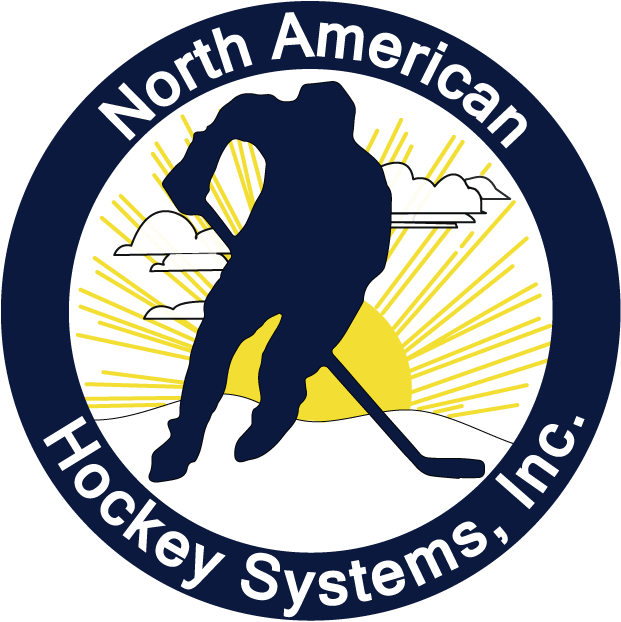 North American Hockey Systems, Inc.
North American Hockey Systems, Inc.
 North American Hockey Systems, Inc.
North American Hockey Systems, Inc.
What part of hockey do you actually teach?
NAHS focuses on the major skill areas of hockey: skating, stick/puck control, passing, and scoring. The school focuses on the foundational skills that prepare a player for game skills and hockey systems that are taught by team coaches.
Why do you spend so much time on drills versus scrimmaging?
Scrimmaging, while fun, does little in helping players become more skilled. Game playing develops primarily the mental aspects of game strategy. Age 0 through 10 are the prime years for developing coordination in a human mind and body. From age 10 to 13 this diminishes and now all that you have learned coordination-wise, is your operating system.
Attend a high school game and you will see the biggest disparity there – a few trained players trying to play with the untrained. Today’s skilled players are investing countless hours in fundamental skill development. This is absolutely necessary for high level hockey since all skills must be well imbedded in the subconscious memory of the player.
Is it really fun to realize you are unprepared for any situation? Fun in this sport is attained through game performance and knowing your part of the play, not just being on the winning team. Every hockey skill a player wishes to use in a game situation needs to be as available and as simple as walking. Most coaches are aware that if a player can skate well, control the puck, pass and shoot, they can learn his game system. In order to become this skilled player, thousands of correctly done repetitions are required. Even with concentrated effort, it will take some time for these skills to be seen in a game.
Do you offer private lessons?
Yes, private lessons are available with some of the advanced staff at NAHS. However, there are plusses and minuses to private lessons? Some of the advantages include: the lesson is very player specific; the pace is set by players ability; can be useful for players who are playing catch up; great for true leadership players (self driven,etc.). Some of the disadvantages include: higher cost per hour; player dependency on coach to think for them; lots of dead space while player thinks or catches breath; definitely not for the unmotivated.
Group lessons are the best way to train hockey players. Some reasons for this include:
How young do children start this sport?
We’ve had players start as young as 3 years of age, 4 is the average. The best time to start depends upon the maturity and interest of the child.
What are equipment requirements for your programs?
Full hockey equipment is required for all players, except in learn to skate mini mite classes. The minimum requirement is helmet with face cage, elbow pads, gloves, shin pads, and properly fitted skates.
My teenage son or daughter would like to learn hockey, is it too late?
Absolutely not! We’ve had a number of teenagers learn to play hockey well enough to win awards. Skills can be taught at any age, including adults. The athletic ability, motivation, and well as the extra hours the player is willing to invest in the game will all impact on the rate they acquire the skills. They may not move as fluidly as a player who began at 5 or 6 years of age, but they can enjoy it just as much!
My son or daughter is a high level player, what can you offer him/her?
NAHS offers high level skill development that helps advanced players reach their highest level of proficiency. During the school year, several classes per week are available for players with five to ten years of skill development and/or game play. In the spring months we have a spring invitational for advanced players. In the summer, one of our weeks is devoted to the advanced player.
Do you have any programs specific to girl’s/women’s hockey?
Currently our programs allow both boys and girls. Class space is available for groups of women or girls in our rink in Troy, NY. If you would like to coordinate a group, contact us. NAHS is proud of the many women players who have gone on to play competitive hockey. Some return to work with the regular staff during summer programs and/or specialty camps and clinics.
How do we set up a clinic or summer school in our rink?
Just contact us and let us know what you’d like to set up. You can reach us by phone, fax, email or postal mail using the information in the contact section of this Web site.
NAHS is able to accommodate most requests, and we’d be happy to speak with you about providing trained coaches to run a program that suits your group at your rink. We’ve been a part of training hockey players in a variety of areas in the United States and Canada. We look forward to the opportunity to work with you.